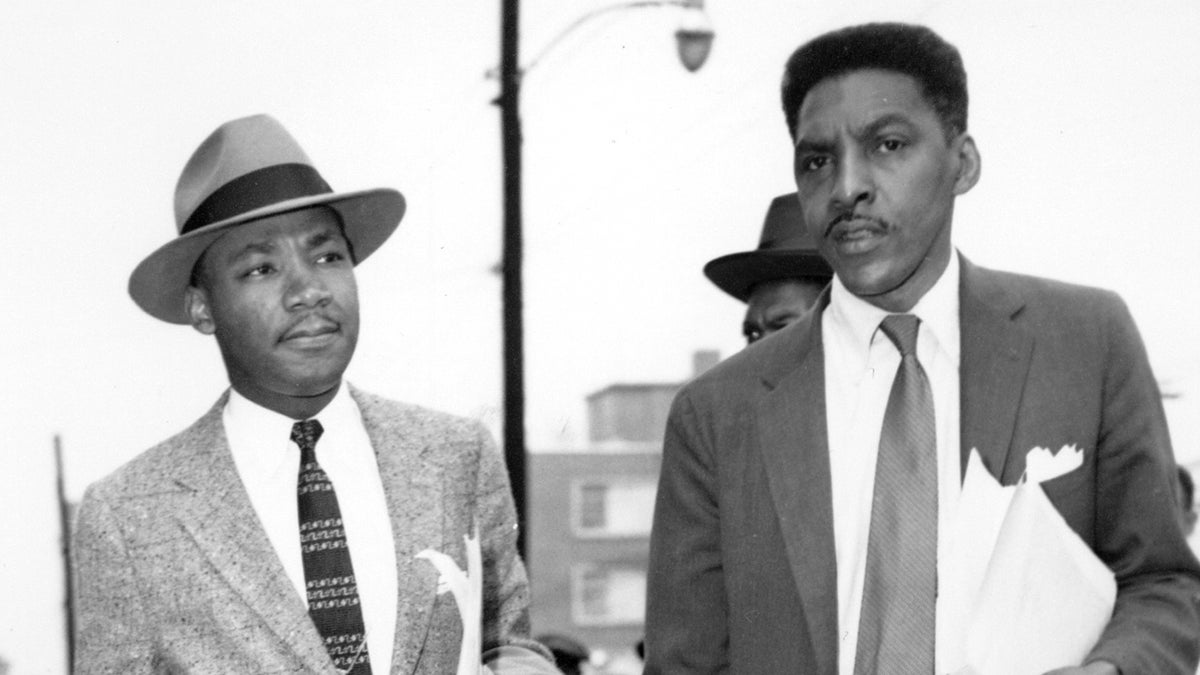It’s time for Hollywood to make a movie about Bayard Rustin

From left: Rev. Dr. Martin Luther King, Jr., and Bayard Rustin, two leaders in the Montgomery, Ala., bus boycott, are shown leaving the Montgomery County Courthouse on Feb. 24, 1956. (AP Photo)
When will someone finally make a feature film about Bayard Rustin? Hollywood seems purposefully avoiding a story that rectifies American history and is chock-full of high drama and cinematic plot twists.
The New York Times has wondered about it. So did commentator Marta Rusek recently in this space. And others have also asked the question: “When will someone finally make a feature film about Bayard Rustin?”
There is an amalgam of unsatisfactory reasons as to why the legacy of one of the most important figures of the black Civil Rights movement has yet to grace the silver screen.
A story ready for the big screen
It’s pretty safe to tell the story of a free black man who was forced into slavery for 12 years during the 1800s. The abhorrence factor alone was more than enough to garner deep sympathy.
Films with Martin Luther King at the center have been made for years by Hollywood studios and independent producers. Honoring him is so risk-averse that even a South Carolina Tea Party claimed he was more like them than liberal Democrats this past Martin Luther King Day.
But when it comes to the openly gay black man who organized one of the pivotal events of the 20th Century, The March on Washington for Jobs and Freedom, the risk appears to be too great for studios and production companies to take.
Lingering homophobia could be a big reason.
For example, during a Q&A following the recent stage production about Bayard at La Jolla Playhouse in San Diego, an older black woman was vociferously upset that Rustin was identified as gay. She didn’t want to believe it. What’s more, even if it is true, she thought it didn’t belong in the play. Seriously?
The word around L.A. is that screenplays about Bayard have had trouble getting the green light for years. Hollywood seems purposefully avoiding a story that rectifies American history and is chock-full of high drama and cinematic plot twists.
Few people today are aware that Rustin taught King how to apply the principles of nonviolence during the Montgomery Bus Boycott. Or that civil rights leaders held heated discussions over Bayard’s heading up the March on Washington because he was unabashedly gay. Or that South Carolina Senator Strom Thurmond tried to derail the event by calling Rustin out as a “purr-vert” at a Capitol Hill news conference.
Or, that iconic Harlem Congressman Adam Clayton Powell, Jr., who mockingly referred to gay people as “the boys with the swish and the girls with the swagger,” blackmailed King into cutting ties to Bayard by threatening to announce that the two were lovers.
The latter episode, which filled Bayard with gut-wrenching sadness, is perfect for the silver screen.
The role of a lifetime
I first heard of Bayard in the mid-’90s and was flabbergasted that his contributions were not out front and center in the annals of the Civil Rights moment.
Nearly two decades later, when my writing partners and I finished the 27th and final draft of our Rustin biopic, “Never Speak My Name,” we thought our timing was perfect given the recent resurgence in movies about black historical figures.
We quickly learned differently.
Some producers thought the script was enlightening and well done, but simply not for them. Others refused to consider a script without securing the rights to the story first. This herring is bright red because Bayard was a public figure.
Another problem, some older black actors don’t want to “play gay” for religious reasons and/or fear of being typecast. They are forgetting about the Oscar-winning performances by Philip Seymour Hoffman in “Capote” and Sean Penn in “Milk.”
It would be the role of a lifetime to portray a man whose commitment to human rights meant spending two years in federal prison for refusing to register for the draft during World War II. Bayard also suffered immensely in solitary confinement for leading a rebellion against the horrible prison food.
Rustin’s multitude of heroic feats easily rival those of the brave protagonists in “12 Years A Slave,” “42,” “Selma,” “The Butler” and “The Help.”
He was brutally beaten and arrested for sitting in whites-only sections of buses across the South as early as in the 1940s. For violating Jim Crow laws, he spent 22 days carrying heavy rocks on a North Carolina chain gang and later wrote an expose for The New York Post that got the practice abolished.
Hollywood claims it wants to bring new and inspiring stories to the screen. As we approach the 2015 Academy Awards ceremony with a dearth of nominees of color, the industry must recognize that there are plenty of great stories like that of Bayard Rustin that should be told. Now.
—
Jo Ann Allen is a former WHYY “Morning Edition” host. She co-wrote “Never Speak My Name” with Walter G. Meyer and Stampp Corbin. The script was a 2014 One in Ten Screenplay Contest Finalist. She is moving to Denver to become Colorado Public Radio’s “All Things Considered” host.
WHYY is your source for fact-based, in-depth journalism and information. As a nonprofit organization, we rely on financial support from readers like you. Please give today.

